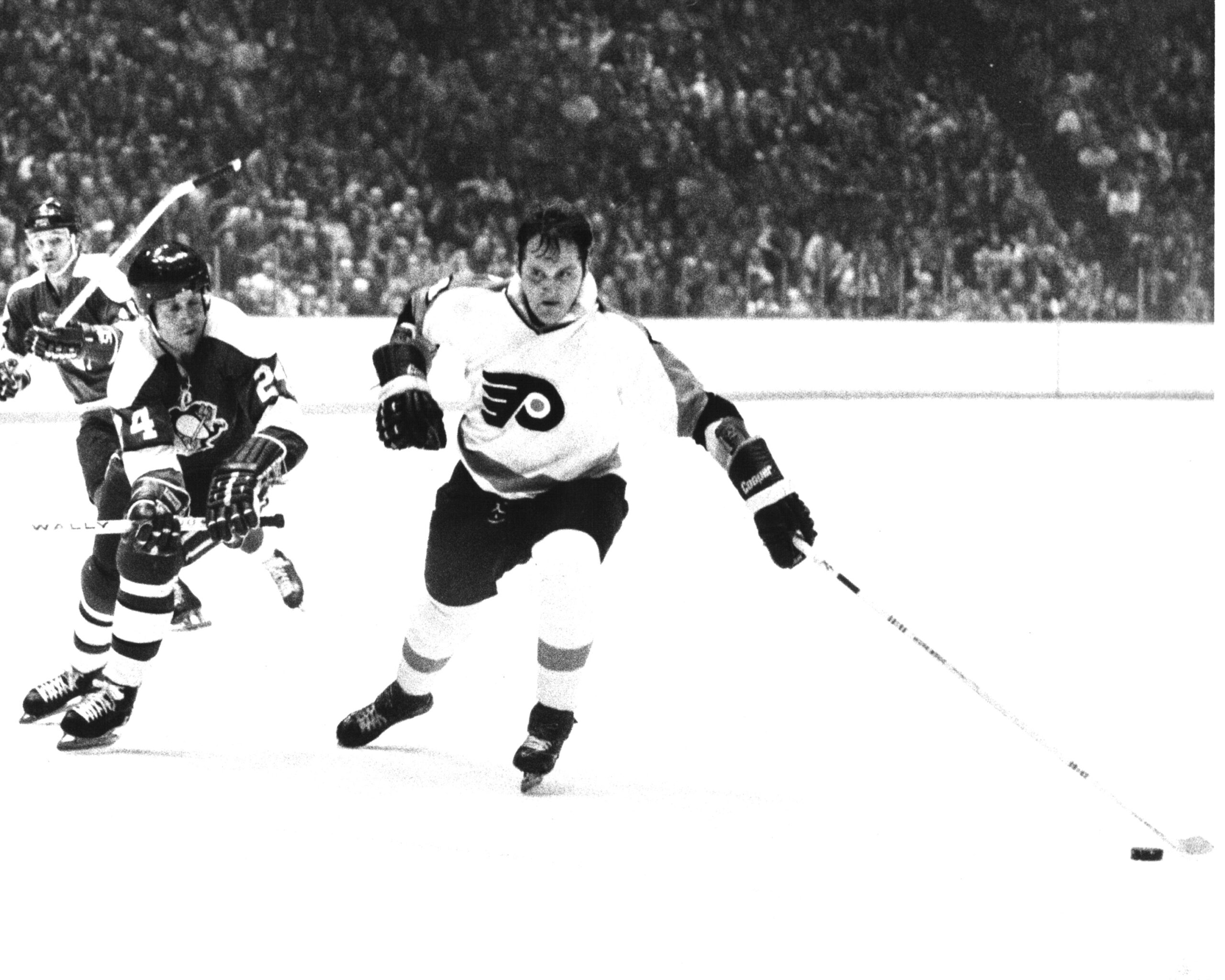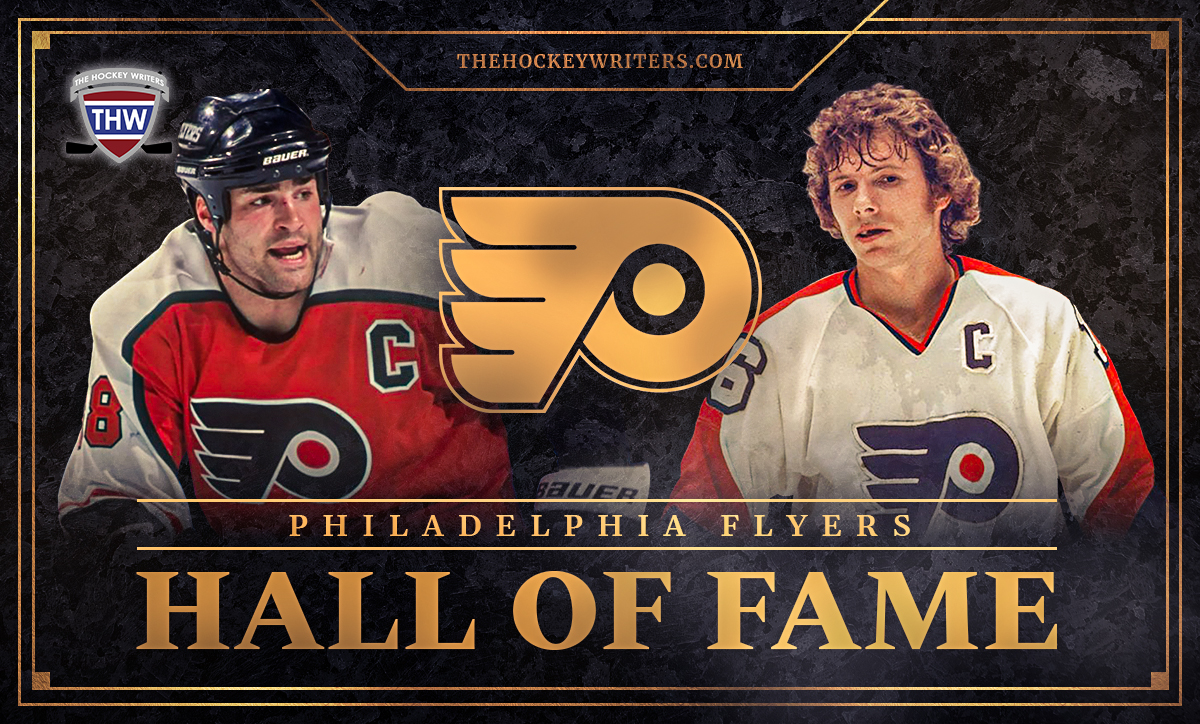When many fans of the Philadelphia Flyers think of their favorite defensemen throughout the franchise’s history, names like Mark Howe, Eric Desjardins, Jimmy Watson, Chris Pronger, and Kimmo Timonen tend to immediately come to mind. For a team that has prided itself on physical play over the years, many tough and talented defensemen have made their mark on the franchise.
Related: Philadelphia Flyers’ Best Defensemen of All-Time
Hard-core fans of the Flyers are undoubtedly familiar with the Barry Ashbee Trophy, an honor presented each season to the team’s best defenseman. This award’s namesake was a former blueliner and coach who appeared in parts of four seasons with the Flyers. Ashbee was respected by teammates and those he coached for his work ethic on the ice and overall dedication to success.
Hershey Bears and Boston Bruins
A native of Weston, Ontario, Ashbee was known as an average skater and passer during his time in the juniors. After a largely unremarkable career with the Kingston Frontenacs of the Eastern Professional Hockey League (EPHL), he joined the Hershey Bears of the American Hockey League (AHL) during the 1962-63 season. He remained with the Bears for parts of seven seasons. In 454 games with the team, he scored 22 goals and tallied 115 assists.
Ashbee was also an important part of Hershey’s six playoff appearances during his time with the club. A major highlight of this stretch of seasons came when the 26-year-old defenseman broke into the NHL with the Bears’ parent club, the Boston Bruins. He made his career debut against the New York Rangers on Nov. 25, 1965.
In 14 games with the Bruins, Ashbee tallied three assists during the 1965-66 season. Despite playing respectably in his first set of big league games, he spent the next three seasons in the AHL with Hershey. During the 1968-69 season, Ashbee was a member of the Bears’ Calder Cup champion team, scoring two goals and tallying five assists in 11 playoff games.
Philadelphia Flyers
Ashbee finally became a regular in the NHL during the 1970-71 season with the Flyers. His strong play with the franchise over the course of four seasons in the burnt orange, black, and white, secured his place as one of the team’s all-time top defensemen. The fan favorite had 82 points (15 goals and 67 assists) in 270 big league games between 1970 and 1974.
Ashbee was a member of two playoff Flyers teams during the 1972-73 and 1973-74 seasons. During the 1972-73 playoff campaign, he tallied four assists in 11 games. That season, the Flyers fell to the Montreal Canadiens four games to one in the semifinals of the Stanley Cup playoffs.

The 1973-74 campaign is one of the most celebrated seasons in Flyers history as it marked the first time the city of Philadelphia captured a professional title in ice hockey. The Flyers, led by all-time greats like Bobby Clarke, Bernie Parent, Bill Barber, and Dave “The Hammer” Schultz, battled their way to a 4-2 series victory over the heavily-favored Bruins in the Stanley Cup Final.
Around all of the glory and celebration, tragedy struck. In Game 4 of the Stanley Cup semifinal series against the Rangers, Ashbee was struck in the right eye by a Dale Rolfe slap shot in overtime. The April 28, 1974 injury was so severe that the Flyers blueliner was taken off the ice on a stretcher. His vision was so negatively affected by the impact of the puck on his eye that the 34-year-old announced his retirement from hockey on June 4, just weeks after that fateful night.
Coaching Career
The following season, Ashbee was offered an assistant coaching job with the Flyers. Believing the position was offered to him out of pity, he initially turned the offer down. After further consideration, he accepted the job, and started to work closely with the team’s defensemen. This opportunity opened the door for Ashbee to have yet another positive impact on the franchise, and ultimately, again have his name engraved on the Stanley Cup as a coach. The Flyers went on to capture their second straight championship during the 1974-75 season with a 4-2 series victory over the Buffalo Sabres.
Tragedy Strikes Again
It was revealed to the Flyers organization that Ashbee was diagnosed with leukemia in April 1977. Even while sick in the hospital, his fierce dedication to the Flyers was evident as he remained in close contact with the team’s players, especially his beloved defensemen. Unfortunately, the cancer spread quickly as multiple treatments failed, and the 37-year-old died on May 12, 1977, in Philadelphia. His death was grieved across the hockey community, and greater sports world, with tributes pouring in from major media outlets such as The New York Times. Flyers owner Ed Snider chartered a plane to Ashbee’s May 1977 funeral in Toronto so that all personnel associated with the Flyers could pay tribute to the man who was loyal to the franchise until the end. His teammate and friend Bobby Clarke delivered the eulogy.
Impact on Flyers
Ashbee’s jersey No. 4 was retired at the beginning of the next season on Oct. 13, 1977. Fourteen years after his death, his impact on the organization was immortalized when he was inducted into the Philadelphia Flyers Hall of Fame in March 1991. That year, he entered the Flyers’ Hall with former teammate and fellow Flyers great, right-winger Gary Dornhoefer.

Arguably, the greatest honor bestowed upon Ashbee by the Flyers is the annual team award that bears his name. First awarded following the 1974-75 season, the Barry Ashbee Trophy is handed out annually to the Flyers’ best defenseman. This award has been presented to a number of franchise greats over the years including Joe Watson, Jimmy Watson, Mark Howe, Eric Desjardins, Chris Pronger, and Kimmo Timonen. It stands as one of the greatest honors that can be bestowed upon a Flyers blueliner. Most recently, Ivan Provorov received this award following the 2022-23 season.